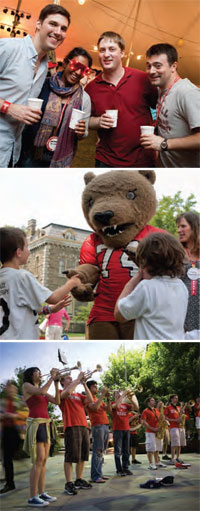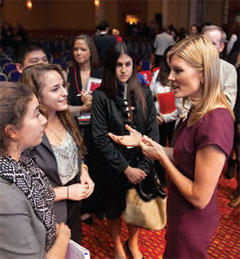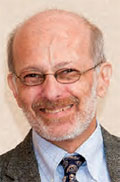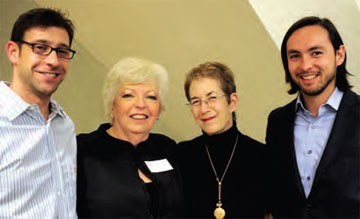The view from a first-time Reunion chair
The view from a first-time Reunion chair
By Shane Dunn ’07

Ask any Cornellian who attends Reunion and you will learn that the main reason for traveling back to Ithaca is to reconnect with classmates and with the University. Hundreds of alumni events—formal and informal—are held around the world each year, but nothing can compare with the experience of returning to East Hill.
At least that’s what I have been told—and I am ready to experience it. In June, I will celebrate my first Reunion. And because attending was not enough for me, I decided to help shape my classmates’ experience by volunteering as a Reunion co-chair. I am one of more than thirty chairs across the classes, from the 5th through the 65th, who will be in Ithaca June 7–10. We are the people who do our best to make coming back worth the time, effort, and expense—and pretty much give up our free time in the months leading up to Reunion.
You see, one thing I did not understand before signing on the dotted line as a Reunion chair was the amount of time, effort, and work it takes to pull it all off. In fact, many alumni who walk into their class headquarters at Reunion don’t realize that the chairs have been planning for this for an entire year.
From June to June
The planning process begins the previous June, when next year’s leaders attend Reunion, going to events and sampling catering options. The chairs begin to develop their plans over the summer, but the work officially starts in September at Reunion Kick-off (RKO), when the chairs and other class leaders come to the Statler Hotel for an intensive weekend of workshops, information sessions, meetings, and food tastings. Everything from child care to risk management issues to liquor licensing rules are covered. For first-timers, it’s Reunion boot camp.
After RKO, the real work begins. Although the Alumni Affairs staff is incredibly resourceful, professional, and helpful, class volunteers are responsible for making their Reunion unique and memorable: budgeting, choosing caterers, working with Cornell Housing, ordering souvenirs, and planning special events, to name just a few of the myriad tasks. Then, in late January, at the Cornell Alumni Leadership Conference (CALC), chairs meet again to get updates, share best practices, and finalize plans. “It’s a wonderful way to get to know other classmates and feel like you have provided an experience that just cannot be matched,” says Ruth Zimmerman Bleyler ’62 who is co-chairing her class’s 50th Reunion.
Following CALC, Reunion planning for class volunteers kicks into high gear; registration information is checked, special events are confirmed, and contracts are signed. The spring is all about finding ways to encourage classmates to return, answering loads of e-mails, and making sure everyone will have a great time.
Meeting expectations
The work of a Reunion chair is part mind-reader, part wedding planner. Pre- and post-Reunion surveying has become key to learning about classmates’ preferences. For example, in November 2011, my co-chairs and I sent out a survey to help guide our planning; more than 600 classmates responded. The data informed much of the decision-making about what food to serve, which souvenirs to purchase, even what music to play.
For the Class of ’87, a survey helped planners understand their classmates’ expectations for their 25th. Over the summer, the chairs distributed a survey to classmates who come back to Reunion often. “It’s easy to know what I expect from Reunion, but this is not a reunion for my friends; it’s for my entire class,” says co-chair Melissa Hodes ’87. “So we needed to know whether they wanted more adult-only events or were expecting family-oriented activities, whether they like to go to the tent parties—they do—or wanted something at headquarters after-hours instead.” According to Hodes, what their classmates told them is that while many of them would be leaving their families at home, others—especially those who are beginning to think about their children’s college plans—wanted to show off Cornell to their kids. So ’87 is planning several adult activities (such as a wine tasting), while making sure there are family events (a karaoke night, participating in Fun in the Sun); the class is also sponsoring an admissions session, not only about getting into Cornell, but the process in general.
Kudos to class programs
While volunteers spend hundreds of hours on vision and logistics, Reunion planning and execution couldn’t happen without the Alumni Affairs class programs team, led by Margaret Gallo ’81, Lynne Conway, and Cathy Forster Hogan ’70. “A Reunion chair could not do it all without their amazing help,” says Terry Kilmer Oosterom ’82. “They keep us on track with what needs to be planned, when schedules need to be updated, and too many other things to list. Their role is critical.”
In my own experience, the staff is vital in being the conscience of Reunion planning, especially for first-timers—encouraging them to have realistic expectations and helping us develop a program that is memorable and representative of Cornell. “They guide us and offer structure and advice,” says Jean Kintisch ’92. “They do a ton of work all year and are always seeking to improve.” To drive home the importance of the class programs team throughout Reunion, Hodes adds that, “even though Reunion chairs put in so many hours—especially during the spring, when it takes over your life—the staff is working just as hard to support and comfort you during this time.” I speak for my ’07 co-chairs when I say that we are incredibly grateful for the wisdom, guidance, support, and patience the class programs team provides.
You can’t please everyone
There are inherent challenges in planning a weekend-long celebration for hundreds of intelligent, independent, strong-minded, passionate people. Reunion planners are innately people pleasers who aim to engineer a memorable experience for everyone who attends. But, in speaking with the more experienced chairs, I’ve been advised that something will always go wrong and it is inevitable that some attendees will be upset. “It’s a good thing the positive outweighs the negative with Reunion planning,” says Oosterom. “After doing this three times, I’ve learned to let things roll off my back.”
At last, Reunion is here
Come the second week of June, Reunion chairs arrive early, going through one final workshop, meeting with their undergraduate clerks, running around Ithaca making last-minute purchases, and going over final plans with housing and caterers. After all of the research, e-mailing, letter writing, and phone calls, it all comes down to the big weekend in June. Cornell Reunion is poised to be a memorable experience.
Reunion cannot come soon enough for me. What am I looking forward to the most? Being on campus with 6,000 friends who are as excited as I am to relive their days on the Hill—and, of course, getting a PMP from the Hot Truck.
Shane Dunn ’07 is a Reunion co-chair and a director from the region on the board of the Cornell Alumni Association. He lives in Boston.
Alumni Leaders Converge on D.C.
Nearly 1,000 Cornell alumni leaders, staff, and students came together in Washington, D.C., in late January for the third annual Cornell Alumni Leadership Conference (CALC). Through three days of meetings and events, alumni leaders received updates from the University, learned best practices, and networked with Cornellians from all over the world.

This year’s conference again offered a broad range of tracks designed for specific volunteer areas: class leaders, regional club leaders, CAAAN chairs, Greek alumni, and diversity leaders. Other sessions focused on how to take advantage of social media, develop a Cornell volunteer career, and create effective events. Reunion chairs had a daylong training session, and class councils held their annual meetings.
Friday’s activities were capped by a panel discussion entitled “The Value of Leadership in the Twenty-First Century,” moderated by Kate Snow ’91 of NBC’s “Rock Center.” The four panelists—political pundit S. E. Cupp ’00, Washingtonian Magazine publisher Catherine Merrill Williams ’91, former Time, Inc., executive editor Sheryl Hilliard Tucker ’78, and Pulitzer Prize-winning journalist Sheryl WuDunn ’81—discussed a variety of topics, sometimes heatedly; they ranged from the failure of leadership among our political leaders to the lack of women in corporate boardrooms. One thing the panelists agreed on is that Cornell gave them the foundation to explore their career options. Snow joined WVBR to be a D.J., but found her calling as a journalist by covering Ithaca politics; Cupp was a Daily Sun editor; Tucker edited independent publications that often challenged the University.
Highlights from Saturday included a packed afternoon session featuring Risa Mish ’85, JD ’88, on “resilient leadership.” Mish, a senior lecturer and director of the Leadership Skills Program at the Johnson School, spoke about the characteristics that can make us stronger leaders.
As always, one of the weekend’s most popular events was Saturday’s lunch featuring President David Skorton. Addressing a large alumni body for the first time since Cornell was awarded the NYC Tech campus, Skorton was welcomed with a standing ovation. He spoke about the new campus and the impact it will have not only on Cornell, but on the city as well.
Both the Friday evening panel discussion and Skorton’s speech were streamed live via the CAA Facebook page and can be viewed online via CornellCast at www.cornell.edu/video.
Next year’s CALC will take place January 18–20 in a new location: Boston.
In Memoriam: Steve Siegel ’68
By Scott Pesner ’87
I have to admit that when I first met Steve Siegel ’68, I found him a little abrupt—and, to be honest, argumentative. At the time, I was beginning my alumni volunteer career and Steve had long proven himself one of Cornell’s key leaders. I soon discovered that what I took for orneriness on Steve’s part was actually a thoroughness and attention to detail; what may have gotten off to a rocky start developed into a friendship and mentorship. When Steve passed away in January, Cornell lost a leader who made a difference.
 Steve’s career as an alumni leader began as a CAAAN volunteer—first in New Jersey, where he grew up, then in New York, where he eventually became the general CAAAN chair (a position I now hold). But Steve’s real calling began in the late Seventies with the creation of the Cornell University Gay and Lesbian Alumni Association (CUGALA), one of the first gay and lesbian college alumni associations in the country. To understand what Steve and his fellow alumni were up against: the University initially told CUGALA that the words “Cornell alumni” and “gay” could not appear in the title of a recognized organization. But Steve persevered, overseeing CUGALA for more than thirty years, keeping his own contact lists of alumni—as many were not publicly out—and supporting not only alumni activities but also on-campus events with students.
Steve’s career as an alumni leader began as a CAAAN volunteer—first in New Jersey, where he grew up, then in New York, where he eventually became the general CAAAN chair (a position I now hold). But Steve’s real calling began in the late Seventies with the creation of the Cornell University Gay and Lesbian Alumni Association (CUGALA), one of the first gay and lesbian college alumni associations in the country. To understand what Steve and his fellow alumni were up against: the University initially told CUGALA that the words “Cornell alumni” and “gay” could not appear in the title of a recognized organization. But Steve persevered, overseeing CUGALA for more than thirty years, keeping his own contact lists of alumni—as many were not publicly out—and supporting not only alumni activities but also on-campus events with students.
But if you defined Steve’s involvement just by CUGALA, you’d miss a good portion of his contributions. He was a board member of Cornell Hillel. He was active in alumni activities in New York, serving on the planning board of NYC Cornellians. He was a member of the University Council. He served on the Committee on Alumni Trustee Nominations. Three years ago, he was elected president of the Class of 1968. And last year, he became a CAA vice president, having served on the board for fifteen years.
In spring 2011, Steve learned that he would receive Cornell’s highest alumni honor, the Frank H. T. Rhodes Exemplary Alumni Service Award. It was more important to him than many realized. During the winter, Steve had shared with a few of us that he had been diagnosed with cancer and that the prognosis wasn’t good. He hoped he’d be well enough to attend the ceremony in September—but I knew he would, because I saw from my very first encounter with him that he was a fighter. And sure enough, there he was—full of pride and never looking better. I believe that receiving that award kept him alive. It was also the last time I would see him in person.
Steve continued his work for Cornell. He never missed our monthly CAA executive committee conference calls, although you could tell from his voice he was growing weak. On our CAA call in January, Steve announced he would step down from his board position to take care of his health.
Two years ago, some gay Cornell students asked me if I thought they would be accepted by other alumni after they graduated. That question reminded me of the 2008 funeral of Steve’s partner of twenty-nine years. Not only were their families and friends there, but so was Cornell—alumni leaders from all parts of the University had come to support Steve.
In January, I sat in that same chapel, this time mourning my friend and colleague. If it’s true that the respect you’ve garnered over your lifetime is reflected by the number of people who show up for your funeral, it demonstrated the difference that Steve made. As I looked around a standing-room-only chapel, I saw Steve’s Cornell life around me, from his college roommates to alumni leaders to Alumni Affairs staff members. I truly believe that Cornell helps us create a special family that lasts a lifetime. Steve was part of our family, and we will miss him.
Scott Pesner ’87 is a CAA vice president.
Rolling Out the (Big) Red Carpet
Cornell in Hollywood honored two Academy Award nominees at the Cornell Club of Los Angeles’ Oscar party in February: Thelma Schoonmaker ’61 (nominated for best editing for Hugo) and Danfung Dennis ’04, BS Ag ’05 (nominated for best documentary for Hell and Back Again).
This was CCLA’s second annual gathering. In 2011, the three Cornellians nominated also attended, and all won Oscars: David Seidler ’59 (best original screenplay, The King’s Speech), Ryan Silbert ’02 (best live action short, God of Love), and Chris Allen ’94 (technical achievement). Unfortunately, neither of this year’s nominees went home with the award.

Seven-time nominee Schoonmaker, a former English major, described how she began editing director Martin Scorsese’s films in the Sixties when she took a film class with him in New York City. She has edited all of his films for the last thirty years, winning Academy Awards for Raging Bull, The Aviator, and The Departed. She described her process of working with Scorsese as “providing a sounding board.” She spoke about the difficulties and rewards of moving from film to digital images; with Hugo, she met the challenge of editing a 3-D movie.
First-time filmmaker Dennis, who majored in economics, said his career path was set when he picked up a book of war photographs as a student. He went to the Middle East war zones and began selling his images of combat to major publications worldwide. He devised a process for using a small, still camera to shoot twenty-four frames a second—essentially a movie. Embedded with a Marine rifle company in Afghanistan, he covered the fighting there and one injured man’s return home.
More than 100 alumni attended the party, which was organized by Cornell in Hollywood co-chairs David Greenman ’00 and Nancy Mills ’64. The event took place in the law offices of David Halberstadter ’79, a partner at Katten Muchin Rosenman LLP and a member of the Cornell in Hollywood board of directors.


